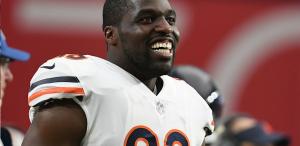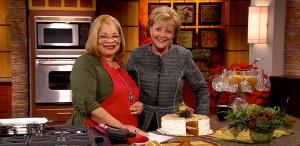Darryl Strawberry: A Changed Man
CBN.com Darryl Strawberry was perhaps one of the most electrifying players in Major League Baseball history. He entering the league with the New York Mets in 1983. Throughout his 17-year career, he made eight consecutive all-star game appearances and captured four World Series championships! But his baseball prowess on the field at times was largely overshadowed by his controversial life off of it. It had lot to do with how he grew up.
“My childhood always was a real disaster,” he tells The 700 Club, “due to the fact that I had a tremendous fear factor in my life from my father. He was a very abusive, raging alcoholic.”
Darryl grew up in south central Los Angeles with his four siblings Mike, Ronnie, Regina and Michelle. Their father, “Big Hank”, was prone to fits of rage -- mostly to Darryl and his older brother Ronnie.
“Me and Ronnie was basically his whopping pole. He would lay us across the bed. We had our shirts off, and he would have like an extension cord. He would beat us and tell us, ‘You’re never going to be nothing. You don’t do nothing right,’ and it was just so bad. I was terrified inside of the fact that what he was saying to me I truly believed it.”
When Darryl was 13 years old, one night he and his brothers decided to take a stand.
“That night when he came home, he was drunk, abusive to my mom. My older brother Mike finally confronted him,” Darryl recalls. “Told him to just get out of here and leave us alone. My dad was went into a rage. He pulled out a shot gun and started making threats about, ‘I’ll kill all of you guys.’ Ronnie grabbed a butcher knife, and I grabbed a frying pan skillet. Ronnie was thinking along the same lines I was thinking. Only one’s dying here tonight is him.”
Big Hank backed down. The police came to their home and told him to leave. Their mother was left with five kids to raise on her own.
“What a remarkable woman. She loved her kid. It didn’t matter whatever the struggle it was going to be. She was going to take care of us.”
While Darryl’s life at home was finally peaceful, his father’s abuse stuck with him. But he began to use baseball as an outlet to channel his anger.
“I thought I was bigger than life and nobody could tell me nothing. That wasn’t anything personal, it was always because of the fact that I had been controlled for so long. Now, this was my outlet, and this was where nobody was ever going to control me again.”
Despite his bad attitude, his talent was undeniable. He was the No. 1 draft pick in 1980 and was selected by the New York Mets. After three long years in the Minors, he was brought up to the Majors. He also married his first wife Lisa. He had a stellar rookie season and earned the Player of the Year award in 1983. But with all the fame also came the pressure to perform.
“If I did something good, ‘he’s great.’ If you do something wrong, ‘he’s not hustling. He doesn’t look like he’s playing hard.’ When I hit tremendous bombs and win games, ‘oh, he’s great.’ So it was a no-win situation.”
The pressure came in from all sides. Eventually, Darryl turned to drugs to deal with it.
“I did everything to make me feel good. I drank alcohol, took amphetamines. Later down the line, I got introduced heavily into cocaine, which was my outlet and my escape. That was the biggest escape for me. When I found that, I can escape away from everybody and everything.”
Even though Darryl’s personal life was crashing, he helped lead the Mets to the 1986 World Series championship. Then in 1990, he accepted a lucrative deal to play with the Los Angeles Dodgers.
“I regret that I left New York. I had had it with New York, not the fans. I had had it with the media.”
Darryl spent three seasons with the Dodgers, and because of his drug habit, his career was hitting rock bottom. He was eventually traded to the San Francisco Giants. But while he was in L.A., his wife invited him to a convention by evangelist Morris Cerello.
“That weekend, all I did was cry when I heard him up there preaching,” Darryl says. “He said, ‘This Sunday, I’m going to lay hands on everybody that comes in here.’ That was the most remarkable move I had ever seen in my life. There was a line formed. The power of God hit me, and when I got up, my belly was like a river. It was just like a river. I had never experienced anything like that in my life.
“I was out of baseball, and I was not with anyone at that time. My mom passed away. I wasn’t going to play any more baseball, because I had been suspended from the league for drugs. I had went through that battle, and I just kind of like had had enough.”
After rehab Darryl entered the lesser known independent league. It wasn’t long before he received an unexpected call, it was the New York Yankees.
“Mr. Stienbrenner brought me back to New York. What a gift. He’s a person that I’m always grateful for, because of the fact, when everybody had written me off, he didn’t care what the opinions were. He said, ‘He’s a New Yorker. He belongs in New York. He’s going to play for the Yankees.’”
Darryl’s career was back on track. He married his second wife Charrise and also helped his team win the ‘96 and ‘98 World Series championships. Again his life appeared to be shaping up on the field, but at home, his drug habit had resurfaced. It began to affect his marriage.
“It was more different relationship with Charisse than with Lisa. Things had changed a little different in my life, but I had that anger and those abusive ways.”
Not only were things at home coming undone, but at the end of the ‘98 season Darryl was diagnosed with colon cancer.
“The doctors said it’s just amazing. This tumor didn’t burst open and spread throughout your body,” he remarks.
Miraculously, after surgery and six months of chemotherapy, he was back on the field the next season and helped the Yankees their third World Series championship in four seasons. But after the ‘99 season, Darryl’s life took a turn for the worst again when he was arrested for soliciting a prostitution and drug possession. He was suspended from the League. Over the next five years, Darryl lost everything -- his career, his wife, and he almost lost himself, but he managed to go to a drug recovery convention where he met Tracy.
Tracy could relate to Darryl, because she had her own struggle with drug addiction. She says, “I saw a man that was very broken, even physically. A person who has addiction themselves, I could look in him and see he wasn’t even clean yet. He was sitting in his seat full of heaviness.”
“I was hurting so much,” Darryl recalls. “I was angry and mad. She came into my life, and I saw something different in her eyes.”
Tracy and Darryl became good friends. Even though, Darryl was still struggling, a born again Christian Tracy proved to be a guardian for Darryl.
“I would plead with God not only for my own life, but standing in the gap for Darryl. Not even knowing what that statement meant,” Tracy explains. “Just being on my face and praying and crying out to God. ‘God, show Yourself to me. Save us, transform us, take this desire out. Get this out of me. , Get this out of him. Wherever he is, cover him.’ I had enough light in me, just a flicker in me, to want to reach out and literally save him.”
Tracy’s example soon began to rub off on Darryl, and he knew it was time to make a change.
Darryl says, “I just had to surrender. I had to get with God myself. I had to separate myself from everything and everybody. God was calling me, and it was either I was going to answer this call or I was going to die.”
Darryl went back to church and rededicated his life to the Lord. This time it was for good. Tracy and Darryl married in 2006. Today, they are both doing better than ever. Darryl is currently working closely with the Mets organization. Together with Tracy, they founded the Darryl Strawberry Foundation, which is dedicated to children and adults with autism. For years, Darryl’s life was surrounded by controversy, but these days he’s a changed man.
“I want them to see the remarkable man who I always knew I had the capabilities of being. And not playing baseball, but the remarkable man God has me. They see that today. I am so proud of what the Lord has done for me and through me. You become a splitting image of God’s image when the world can see that You’re different.”





